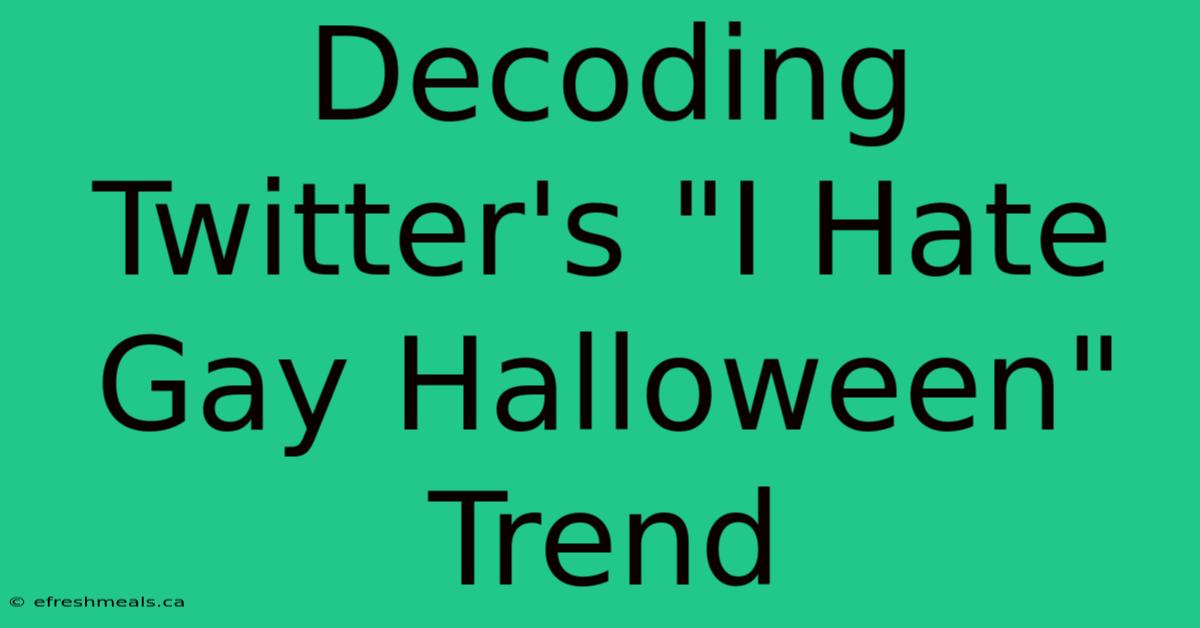Decoding Twitter's "I Hate Gay Halloween" Trend

Discover more detailed and exciting information on our website. Click the link below to start your adventure: Visit Best Website nimila.me. Don't miss out!
Table of Contents
Decoding Twitter's "I Hate Gay Halloween" Trend: A Deeper Look at Online Toxicity
Have you seen the "I Hate Gay Halloween" trend on Twitter? While it seems like a jarring, hateful phrase, understanding its context reveals a complex story of online humor, satire, and the dangers of misinterpretation.
Why It Matters: This trend highlights a crucial issue in the digital world: the blurry line between humor and hate speech. Analyzing this trend helps us understand how harmful language can spread, how context can be misinterpreted, and how social media platforms struggle to regulate content effectively.
Key Takeaways of "I Hate Gay Halloween" Trend:
| Takeaway | Explanation |
|---|---|
| Misinterpretation of Humor: The trend originated as a joke, playing on stereotypes of gay Halloween costumes. | However, this humor was lost on many, leading to widespread outrage and confusion. |
| Satire's Double-Edged Sword: The trend attempted to use satire to expose societal prejudices, but this often backfires, leading to unintended harm. | The humor was not universally understood, ultimately promoting harmful stereotypes. |
| Context is King: The lack of proper context made it impossible for many to understand the intent behind the trend. | This highlights the importance of clear communication and the need for critical thinking in the digital space. |
Decoding the Trend:
"I Hate Gay Halloween": A Deeper Dive
The "I Hate Gay Halloween" trend emerged on Twitter in 2023, stemming from a satirical meme format that used exaggerated, humorous stereotypes. It centered around the idea that "gay Halloween costumes" are often "too extra" or "outlandish." This led to posts mocking these costumes with phrases like "I hate gay Halloween" or "I hate gay people's Halloween costumes."
The Problem with Satire:
While this trend was initially intended to poke fun at societal expectations and humorously highlight the diverse ways LGBTQ+ individuals celebrate Halloween, it quickly became a platform for harmful stereotypes and misunderstanding.
Key Aspects:
- Misconstrued Intent: The humor was lost on many users, who interpreted the phrase literally, causing offense and sparking outrage.
- Amplification of Prejudice: The trend inadvertently reinforced negative stereotypes about the LGBTQ+ community, promoting harmful biases.
- Online Culture and Context: The rapid spread of the trend highlights the dangers of online culture, where context can be lost and humor misinterpreted.
The Importance of Context:
The "I Hate Gay Halloween" trend underscores the importance of context in online communication. When humor is detached from its original intent, it can easily be misinterpreted and spread misinformation.
The Role of Social Media Platforms:
While platforms like Twitter often implement policies to combat harmful content, the ambiguity of the "I Hate Gay Halloween" trend highlights the challenges of regulating online humor and satire.
Further Analysis:
- The Evolution of Humor: This trend shows how humor can evolve over time, often becoming less relevant and even harmful as it spreads.
- Social Media's Role: Social media platforms play a significant role in amplifying these trends, sometimes without adequate safeguards in place.
- The Impact of Misinformation: The trend's spread highlights the potential for misinformation to spread rapidly online, impacting individual perceptions and fueling prejudice.
FAQ for "I Hate Gay Halloween" Trend:
Q: Why are people upset about this trend? A: Many users interpreted the trend literally, believing it expressed genuine hatred towards the LGBTQ+ community. The trend's satirical nature was lost on them.
Q: Is this trend actually promoting hate speech? A: While the creators might not have intended harm, the trend's impact was undeniably harmful. It fueled existing biases and misinterpretations.
Q: How can we prevent similar trends from happening?
A: Promoting critical thinking, responsible social media use, and encouraging open dialogue about the complexities of online humor are crucial.
Tips for Responsible Social Media Use:
- Be mindful of the content you share: Think about the potential impact of your posts before sharing.
- Check the source: Verify information before sharing it, especially if it seems controversial.
- Engage in respectful dialogue: Avoid inflammatory language and engage in constructive conversations even when you disagree.
Summary by "I Hate Gay Halloween" Trend:
The "I Hate Gay Halloween" trend serves as a powerful reminder of the complexities of online communication and the importance of responsible social media use. It emphasizes the dangers of misinterpretation, the need for clear communication, and the responsibility of social media platforms to prevent harmful content.
Closing Message:
We must remain vigilant in combating online toxicity and promoting a safer, more inclusive online environment. Engaging in critical thinking, embracing empathy, and understanding the power of language are crucial steps towards a more responsible and respectful online world.

Thank you for visiting our website wich cover about Decoding Twitter's "I Hate Gay Halloween" Trend . We hope the information provided has been useful to you. Feel free to contact us if you have any questions or need further assistance. See you next time and dont miss to bookmark.
Featured Posts
-
Lakers Decline Hood Schifinos 3rd Year Option
Nov 01, 2024
-
Halloween A Queer Celebration
Nov 01, 2024
-
Best Halloween Pet Costume Ideas
Nov 01, 2024
-
Us Shippers Avoid East Coast Ports Amid Strike Risk
Nov 01, 2024
-
Kodi Lees Powerful Vocals Fill Arena At National
Nov 01, 2024
